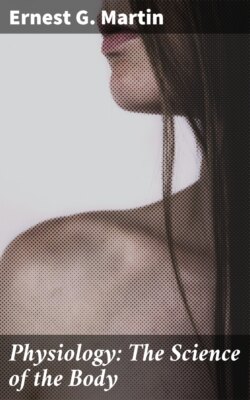Physiology: The Science of the Body

Реклама. ООО «ЛитРес», ИНН: 7719571260.
Оглавление
Ernest G. Martin. Physiology: The Science of the Body
Physiology: The Science of the Body
Table of Contents
PREFACE
CHAPTER I. THE SIGNS OF LIFE
CHAPTER II. THE MAINTAINING OF LIFE
CHAPTER III. THE SOURCES OF FOOD
CHAPTER IV. THE USES OF FOOD
CHAPTER V. BODY CELLS
CHAPTER VI. THE SUPPORTING FRAMEWORK
CHAPTER VII. MOTION
CHAPTER VIII. SENSATION—INTERNAL AND CONTACT SENSES
CHAPTER IX. SENSATION—DISTANCE SENSES
CHAPTER X. THE NERVOUS SYSTEM AND SIMPLE NERVOUS ACTIONS
CHAPTER XI. THE BRAIN AND COMPLEX NERVOUS ACTIONS
CHAPTER XII. SOME SPECIAL NERVOUS ACTIONS; SMOOTH MUSCLE AND GLAND CONTROL
CHAPTER XIII. THE BODY FLUIDS
CHAPTER XIV. THE CONVEYER SYSTEM OF THE BODY
CHAPTER XV. THE SERVICE OF SUPPLY OF FOOD
CHAPTER XVI. THE SERVICE OF SUPPLY OF OXYGEN
CHAPTER XVII. THE SERVICE OF REMOVAL OF WASTE
CHAPTER XVIII. MORE ABOUT THE USE OF FOOD BY THE BODY
CHAPTER XIX. KEEPING WARM IN WINTER AND COOL IN SUMMER
CHAPTER XX. THE PERPETUATION OF THE RACE
CHAPTER XXI. CHILD AND MAN
Отрывок из книги
Ernest G. Martin
Published by Good Press, 2021
.....
Protective motions need to be even more accurately made than those whose purpose is the getting of food, for if the food is missed at one effort another trial may be more successful, but if an attempt to escape fails there will probably be no more chances to try. The sense organs and the nervous system are just as deeply concerned, therefore, in avoiding harm as in finding food materials, and it is as important for them to do their work well in the one case as in the other. When we think of the activities of animals, for whatever purpose they are carried on, we must think of them as made up of the combined actions of the muscles, the nerves, and the sense organs, and not of any of them working by themselves.
These parts of us that are so closely concerned in the maintaining of our life by getting us food and keeping us safe from harm make up, also, the only parts of us which really share in what we may call conscious living. When we come right down to it we could spare our other organs—heart, lungs, stomach, and the rest—and never miss them so far as adding anything to our happiness is concerned. In fact, the less these organs intrude themselves into our attention the better off we are; only when we are ailing do we begin to think about them. Of course, they are absolutely necessary to us, and we should die instantly if one of the more important of them were to stop working, but the part they play is not one which enters actively into our consciousness, as do the muscles, nerves, and sense organs.
.....